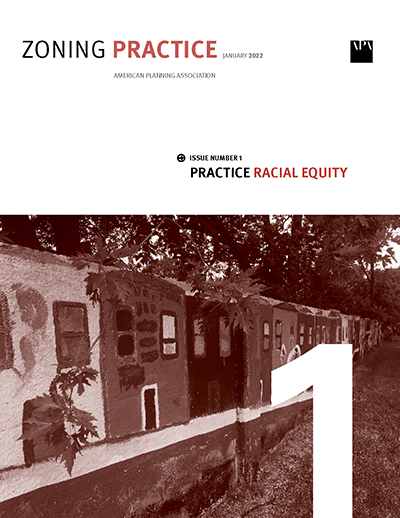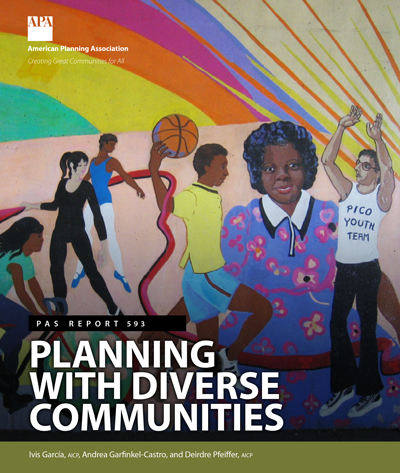Equity Diversity Inclusion
APA has made a focused commitment to Equity, Diversity, and Inclusion in all forms. APA supports planners who work towards achieving thriving communities in which everyone has equal opportunity to live a safe, healthy, and prosperous life.

In this Section
Equity in Practice Case Studies
Equity Diversity Inclusion Blog Posts
February 24, 2025
Building Housing and a Cultural Connection in Sacramento
February 7, 2025Transforming Kansas City’s Historic 18th and Vine District
January 2, 2025Transforming Atlanta's Transit
December 18, 2024Improving Planning Access for South Los Angeles
December 13, 2024
Iowa City Creates Path to Homeownership
October 29, 2024Revitalizing a Stressed Neighborhood
October 24, 2024How Nonprofits Are Shaping Community Organizing
September 25, 2024Advancing Equity Through Solar Energy in Tribal Communities
Featured Equity Diversity Inclusion Resources
-
Community Land Trust Builds Black Generational Wealth in Pricey Orlando Suburb
The Hannibal Square Community Land Trust prioritizes walkability, neighborhood legacy, and Black homeownership.by: Stuart Doyle February 06, 2023The Hannibal Square Community Land Trust prioritizes walkability, neighborhood legacy, and Black homeownership. -
What Is Zoning Reform and Why Do We Need It?
The case for change, why planners support it, and six zoning reform tactics that could help curb housing costs.by: Patrick Sisson January 18, 2023The case for change, why planners support it, and six zoning reform tactics that could help curb housing costs. -
Advance Environmental Justice Goals with This Innovative Health Data Tool
The City Health Dashboard could help communities meet Justice40 mandates, win funding from the Infrastructure Investment and Jobs Act, and improve health outcomes for all.by: Linda McIntyre, AICP December 12, 2022The City Health Dashboard could help communities meet Justice40 mandates, win funding from the Infrastructure Investment and Jobs Act, and improve health outcomes for all. -
How to Uncover and Honor LGBTQ+ History in the Built Environment
Kentucky and Maryland are the first states to use historical context studies to highlight places influential to the LGBTQ+ community — and drive planning efforts.by: Tatiana Walk-Morris May 20, 2022Kentucky and Maryland are the first states to use historical context studies to highlight places influential to the LGBTQ+ community — and drive planning efforts. -
Ending Zoning’s Racist Legacy
Zoning Practice — January 2022by: Jennifer Raitt January 01, 2022This issue of Zoning Practice summarizes how exclusionary zoning practices reinforce patterns of segregation originally established by illegal racial zoning, racially restrictive covenants, and federal policies in the first half of the 20th century. And it highlights steps Boston and Louisville, Kentucky, have taken to begin to rectify these inequities through zoning reforms.List price$0.00ZP subscriber$0.00 -
Planning With Diverse Communities
PAS Report 593by: Ivis Garcia, AICP, Andrea Garfinkel-Castro, Deirdre Pfeiffer, AICP January 01, 2019The U.S. will become a “majority-minority” country by the mid-2040s. More than before, planners must serve diverse publics and build inclusive communities. This PAS Report offers the tools planners need to engage people of color and improve quality of life for all in ethnically and racially diverse communities.List price$25.00APA member & PAS subscriber$0.00 -
Gender-Inclusive Language
PAS QuickNotes 88by: Timothy Burkhardt, AICP, Jacob Reilly, Hally Turner, AICP October 01, 2020This edition of PAS QuickNotes explains the importance of using gender-inclusive language in planning and offers examples of gender-inclusive practices and approaches for planners.Nonmembers$10.00APA members & PAS subscribers$0.00 -
Restorative Planning in Action: Lessons from Mound Up!
by: Austin HarrisonEquity in Practice: Community-led planning effort builds upon Memphis 3.0 to revitalize Orange Mound neighborhood. -
People Behind the Plans: Navigating Mobility Justice with Naomi Doerner
In this episode of the People Behind the Plans podcast series, Naomi Doerner joins host Courtney Kashima, AICP, to talk about what mobility justice looks like in practice, including some inspirational examples from around the world. -
After 140 Years, the Wiyot Tribe Has Come Home
For the first time in U.S. history, a local municipality has returned stolen Native land without an accompanying sale or lawsuit.March 01, 2020After years of local activism, Eureka, California’s city council voted to return a historic 202 acres of Tuluwat Island to the federally recognized Wiyot Tribe.













